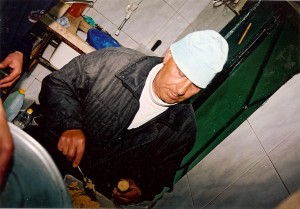 Ovadia Ched died recently. Most residents of southern Jerusalem have felt his impact – even if they never met the man himself – in their stomachs. Ched was the owner of the eponymous felafel stand that has stood on Bethlehem Road in Baka for nearly 40 years.
Ovadia Ched died recently. Most residents of southern Jerusalem have felt his impact – even if they never met the man himself – in their stomachs. Ched was the owner of the eponymous felafel stand that has stood on Bethlehem Road in Baka for nearly 40 years.
Ched was 82 when he died after a long ill- ness. He had already turned over the keys of Felafel Ovadia to his son, Doron, 12 years ago. Doron and I are old buddies of a sort – my friend, Bob, and I have been going out to eat felafel at his establishment nearly every week for some seven years now. By my count, that’s around NIS 7,000 worth of fried chickpeas for each of us, not including drinks. We always get our felafel in a fresh laffa – an Iraqi flat bread that’s rolled into what would be called a “wrap” overseas – never in just a plain pita.
Doron shared with me some of his father’s history. Ovadia Ched (or “Ovad,” as he was called) was born in Baghdad and arrived in Israel in the early 1950s at the age of 17. He was immediately drafted into the nascent IDF, where he learned Hebrew in a hurry. He fought in the Suez Campaign of 1956. Outside the army, he worked as a shoemaker, a trade he’d learned from his father.
Ovad married and had three sons and a daughter. They initially lived in the Beit Hakerem area but quickly moved to Rivka Street in Baka, which was then pretty much a drug- and crime-infested slum – a far cry from the upscale neighborhood it is today.
Ovad shifted from shoes to salads in 1974 when he opened his felafel stand in the same location it is today, between a dry cleaner and a retirement home and across the street from the much more recent American Pie pizza parlor.
In the early days, it was a pretty laid- back operation. “He’d only be open from about 11 a.m until 4 p.m.,” his son says.
The focus then was on the felafel balls; there were few toppings and not even any fries. Doron says he added condiments later on, in particular his famous garlic sauce, which has resulted in lines down the street for all the years I’ve been eating there, and making it, after extensive felafel tasting around the country, Israel’s best in my gastronomic opinion.
The one thing that remains the same is the recipe for the felafel balls themselves. In a way, every time we take a bite at Felafel Ova- dia, we’re honoring the patriarch’s memory.
Doron was in the printing business before taking over from his dad in 2000, a few years before Bob and I began our Wednesday lunch ritual. He’s there most days, although he darts out to the yeshiva on Shimon Street when business is slow. We try to coordinate it so that Doron is on the premises to personally prepare our laffot. After coming for so long, we don’t even have to explain our preferences: I like tehina on top, Bob prefers amba (a tangy mango pickle sauce). Insider tips: skip the French fries and get two extra felafel balls. Don’t be afraid to let someone else go ahead of you – balls fresh out of the oil are worth the wait. And go easy on the hot sauce; it’s really hot (Doron makes it him- self every morning).
These days, Felafel Ovadia is open until 8 p.m. and midday on Fridays. Service remains relaxed – there’s no room for more than two guys (or gals – every once in a while Doron’s wife pitches in) working side by side, and expanding the opera- tion to a second pot of oil, for example, is not in the cards.
Don’t bother trying to call for directions – there’s no phone. No website, GPS, cred- it card swiper, napkins or bath- room, either. Just really incred- ible food, focused on the basics (there’s a skillet of shak- shuka out front, but forget about shwarma or any other extensions to muddy the mes- sage). You can snag a CD with kabbalistic blessings (it’s free for the taking, though it’s nice to drop in a little something in return). Deposit your Coke can and Doron donates the redemption fees to charity.
Felafel in a laffa will set you back NIS 18.
Ovadia is survived by his wife, four children, 14 grand- children and three great-grand- children. Remarkably, they all still live in Jerusalem.
This article was published in The Jerusalem Post on February 28, 2013.


{ 1 comment… read it below or add one }
Nice piece, Brian. I missed this one.
{ 1 trackback }